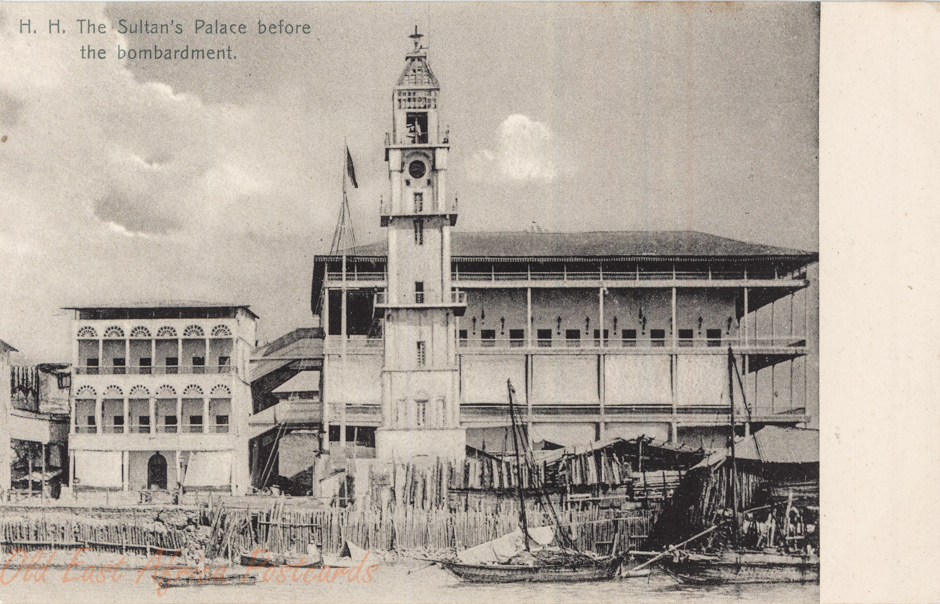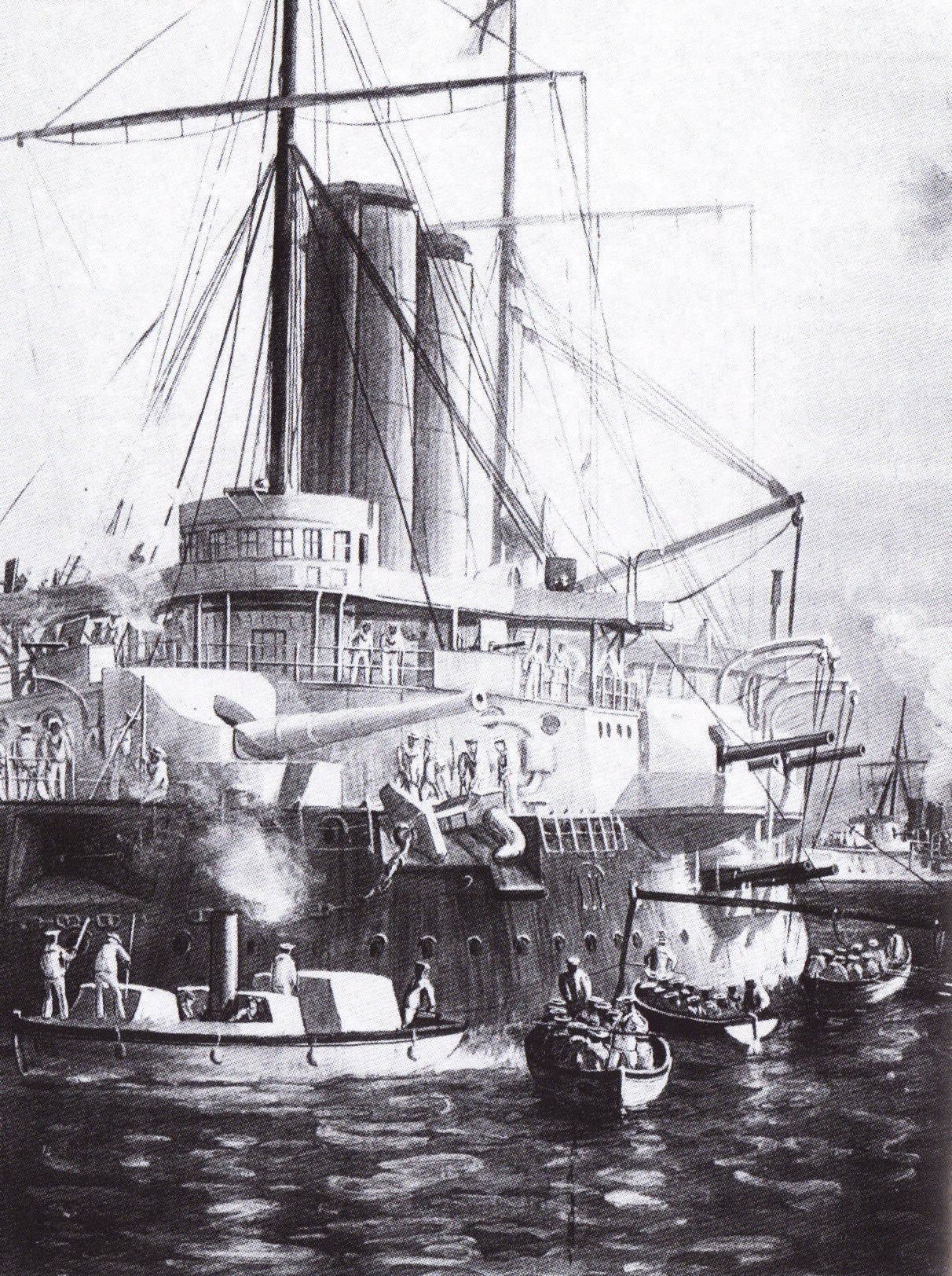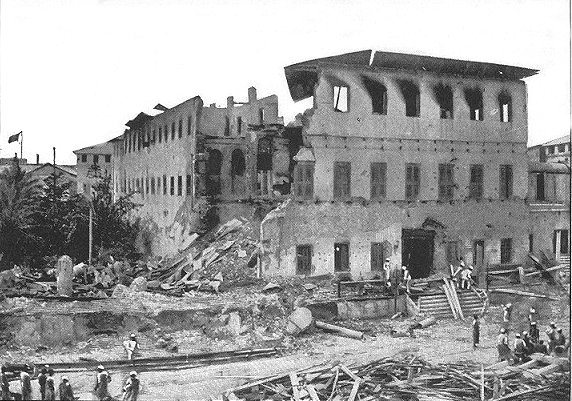Post by lordroel on Aug 25, 2020 3:46:02 GMT
Anglo-Zanzibar War of 1896

The little known Anglo-Zanzibar War of 1896 is generally considered to be the shortest war in history, lasting for a grand total of 38 minutes.
The story begins with the signing of the Heligoland-Zanzibar treaty between Britain and Germany in 1890. This treaty effectively drew up spheres of influence between the imperial powers in East Africa; Zanzibar was ceded to British influence, whilst Germany was given control over mainland Tanzania.
With this new found influence, Britain declared Zanzibar a protectorate of the British Empire and moved to install their own ‘puppet’ Sultan to look after the region. Hamad bin Thuwaini, who had been a supporter of the British in the area, was given the position in 1893.
Map: The islands of Zanzibar and the African mainland

Prelude to the outbreak of the Anglo-Zanzibar War, August 25th 1896
Sultan Hamad, sultan for only three years died suddenly at 11:40. His 29-year-old nephew Khalid bin Bargash (suspected by some of his assassination) moved into the palace complex at Zanzibar Town without British approval, in contravention of the treaty agreed with Ali bin Said. The British government preferred an alternative candidate, Hamud bin Muhammed, who was more favourably disposed towards them. Khalid was warned by the consul and diplomatic agent to Zanzibar, Basil Cave, and General Mathews to think carefully about his actions. This course of action had proved successful three years earlier when Khalid had tried to claim the sultanate after the death of Ali bin Said, and the British consul-general, Rennell Rodd, had persuaded him of the dangers of such an action.
Photo: Sultan Palace before the war which would see it destroyed

Khalid ignored Cave's warning, and his forces began mustering in the Palace Square under the command of Captain Saleh of the palace bodyguard.
By the end of the day, they numbered 2,800 men armed with rifles and muskets. The majority were civilians, but the force included 700 Zanzibari Askari soldiers who had sided with Khalid. The sultan's artillery, which consisted of several Maxim machine guns, a Gatling gun, a 17th-century bronze cannon and two 12-pounder field guns, was aimed at the British ships in the harbour. The 12-pounders had been presented to the sultan by the German emperor Wilhelm II. The sultan's troops also took possession of the Zanzibari Navy sole ship, the in 1878 built Royal yacht but also achting as a wooden sloop HHS GLASGOW.
Photo: HHS GLASGOW, near Zanzibar in 1890

Mathews and Cave also began to muster their forces, already commanding 900 Zanzibari askaris under Lieutenant Arthur Edward Harington Raikes of the Wiltshire Regiment who was seconded to the Zanzibar Army and held the rank of brigadier-general. 150 sailors and marines were landed from the Pearl-class protected cruiser PHILOMEL and the gunboat THRUSH, which were anchored in the harbor. The naval contingent, under the command of Captain O'Callaghan, came ashore within fifteen minutes of being requested to deal with any rioting caused by the general population. A smaller contingent of sailors under Lieutenant Watson of THRUSH were put ashore to guard the British consulate, where British citizens were requested to gather for protection. HMS SPARROW, another gunboat, entered the harbor and was anchored opposite the palace next to Thrush.
Photo: on the left HMS PHILOMEL and on the right HMS THRUSH

Some concerns were raised among the British diplomats as to the reliability of Raikes' askaris, but they proved to be steady and professional troops hardened by military drill and several expeditions to East Africa. They would later become the only land troops to be fired upon by the defenders. Raikes' troops were armed with two Maxim guns and a nine pounder cannon, and were stationed at the nearby customs house. The sultan attempted to have the US consul, Richard Dorsey Mohun, recognize his accession, but the messenger was told that "as his accession had not been verified by Her Majesty's government, it is impossible to reply."
Cave continued to send messages to Khalid requesting that he stand down his troops, leave the palace and return home, but these were ignored, and Khalid replied that he would proclaim himself sultan at 15:00. Cave stated that this would constitute an act of rebellion and that Khalid's sultanate would not be recognized by the British government.
At 14:30, Sultan Hamad was buried, and exactly 30 minutes later a royal salute from the palace guns proclaimed Khalid's succession. Cave could not open hostilities without government approval and telegraphed the following message to the Foreign Office of Lord Salisbury's administration in London: "Are we authorized in the event of all attempts at a peaceful solution proving useless, to fire on the Palace from the men-of-war?" Meanwhile, Cave informed all other foreign consuls that all flags were to remain at half mast in honour of the late Hamad. The only one that did not was a large red flag flying from Khalid's palace. Cave also informed the consuls not to recognize Khalid as sultan, to which they agreed.

The little known Anglo-Zanzibar War of 1896 is generally considered to be the shortest war in history, lasting for a grand total of 38 minutes.
The story begins with the signing of the Heligoland-Zanzibar treaty between Britain and Germany in 1890. This treaty effectively drew up spheres of influence between the imperial powers in East Africa; Zanzibar was ceded to British influence, whilst Germany was given control over mainland Tanzania.
With this new found influence, Britain declared Zanzibar a protectorate of the British Empire and moved to install their own ‘puppet’ Sultan to look after the region. Hamad bin Thuwaini, who had been a supporter of the British in the area, was given the position in 1893.
Map: The islands of Zanzibar and the African mainland

Prelude to the outbreak of the Anglo-Zanzibar War, August 25th 1896
Sultan Hamad, sultan for only three years died suddenly at 11:40. His 29-year-old nephew Khalid bin Bargash (suspected by some of his assassination) moved into the palace complex at Zanzibar Town without British approval, in contravention of the treaty agreed with Ali bin Said. The British government preferred an alternative candidate, Hamud bin Muhammed, who was more favourably disposed towards them. Khalid was warned by the consul and diplomatic agent to Zanzibar, Basil Cave, and General Mathews to think carefully about his actions. This course of action had proved successful three years earlier when Khalid had tried to claim the sultanate after the death of Ali bin Said, and the British consul-general, Rennell Rodd, had persuaded him of the dangers of such an action.
Photo: Sultan Palace before the war which would see it destroyed

Khalid ignored Cave's warning, and his forces began mustering in the Palace Square under the command of Captain Saleh of the palace bodyguard.
By the end of the day, they numbered 2,800 men armed with rifles and muskets. The majority were civilians, but the force included 700 Zanzibari Askari soldiers who had sided with Khalid. The sultan's artillery, which consisted of several Maxim machine guns, a Gatling gun, a 17th-century bronze cannon and two 12-pounder field guns, was aimed at the British ships in the harbour. The 12-pounders had been presented to the sultan by the German emperor Wilhelm II. The sultan's troops also took possession of the Zanzibari Navy sole ship, the in 1878 built Royal yacht but also achting as a wooden sloop HHS GLASGOW.
Photo: HHS GLASGOW, near Zanzibar in 1890

Mathews and Cave also began to muster their forces, already commanding 900 Zanzibari askaris under Lieutenant Arthur Edward Harington Raikes of the Wiltshire Regiment who was seconded to the Zanzibar Army and held the rank of brigadier-general. 150 sailors and marines were landed from the Pearl-class protected cruiser PHILOMEL and the gunboat THRUSH, which were anchored in the harbor. The naval contingent, under the command of Captain O'Callaghan, came ashore within fifteen minutes of being requested to deal with any rioting caused by the general population. A smaller contingent of sailors under Lieutenant Watson of THRUSH were put ashore to guard the British consulate, where British citizens were requested to gather for protection. HMS SPARROW, another gunboat, entered the harbor and was anchored opposite the palace next to Thrush.
Photo: on the left HMS PHILOMEL and on the right HMS THRUSH

Some concerns were raised among the British diplomats as to the reliability of Raikes' askaris, but they proved to be steady and professional troops hardened by military drill and several expeditions to East Africa. They would later become the only land troops to be fired upon by the defenders. Raikes' troops were armed with two Maxim guns and a nine pounder cannon, and were stationed at the nearby customs house. The sultan attempted to have the US consul, Richard Dorsey Mohun, recognize his accession, but the messenger was told that "as his accession had not been verified by Her Majesty's government, it is impossible to reply."
Cave continued to send messages to Khalid requesting that he stand down his troops, leave the palace and return home, but these were ignored, and Khalid replied that he would proclaim himself sultan at 15:00. Cave stated that this would constitute an act of rebellion and that Khalid's sultanate would not be recognized by the British government.
At 14:30, Sultan Hamad was buried, and exactly 30 minutes later a royal salute from the palace guns proclaimed Khalid's succession. Cave could not open hostilities without government approval and telegraphed the following message to the Foreign Office of Lord Salisbury's administration in London: "Are we authorized in the event of all attempts at a peaceful solution proving useless, to fire on the Palace from the men-of-war?" Meanwhile, Cave informed all other foreign consuls that all flags were to remain at half mast in honour of the late Hamad. The only one that did not was a large red flag flying from Khalid's palace. Cave also informed the consuls not to recognize Khalid as sultan, to which they agreed.










